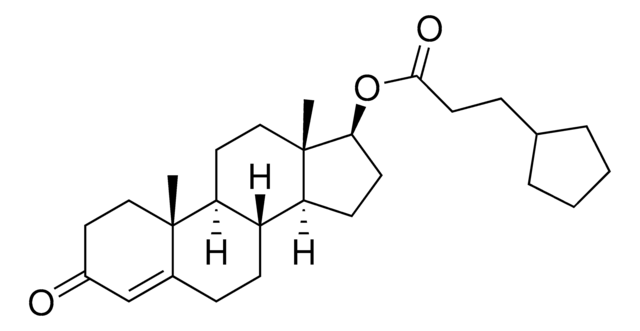1062008
USP
Benzyl benzoate
United States Pharmacopeia (USP) Reference Standard
Synonym(s):
Benzoic acid benzyl ester
About This Item
Recommended Products
grade
pharmaceutical primary standard
vapor pressure
1 mmHg ( 125 °C)
API family
benzyl benzoate
autoignition temp.
896 °F
manufacturer/tradename
USP
availability
not available in (Sales restrictions may apply - USP Product)
refractive index
n20/D 1.568 (lit.)
bp
323-324 °C (lit.)
mp
17-20 °C (lit.)
density
1.118 g/mL at 20 °C (lit.)
application(s)
pharmaceutical (small molecule)
format
neat
SMILES string
O=C(OCc1ccccc1)c2ccccc2
InChI
1S/C14H12O2/c15-14(13-9-5-2-6-10-13)16-11-12-7-3-1-4-8-12/h1-10H,11H2
InChI key
SESFRYSPDFLNCH-UHFFFAOYSA-N
Looking for similar products? Visit Product Comparison Guide
General description
Application
- Topical treatment for scabies: A randomized study compared the efficacy of topical benzyl benzoate versus oral ivermectin for treating scabies, highlighting its potential as an effective treatment option for this parasitic infestation (Meyersburg et al., 2023).
- Repellency against Tribolium castaneum: Research on benzyl benzoate demonstrated its toxicity and repellency efficacy, offering an eco-friendly alternative for controlling the red flour beetle Tribolium castaneum, which poses a significant threat to stored agricultural products (Aboelhadid et al., 2023).
Analysis Note
Other Notes
related product
Signal Word
Warning
Hazard Statements
Precautionary Statements
Hazard Classifications
Acute Tox. 4 Oral - Aquatic Acute 1 - Aquatic Chronic 2
Storage Class Code
10 - Combustible liquids
WGK
WGK 2
Flash Point(F)
298.4 °F - closed cup
Flash Point(C)
148 °C - closed cup
Certificates of Analysis (COA)
Search for Certificates of Analysis (COA) by entering the products Lot/Batch Number. Lot and Batch Numbers can be found on a product’s label following the words ‘Lot’ or ‘Batch’.
Already Own This Product?
Find documentation for the products that you have recently purchased in the Document Library.
Customers Also Viewed
Our team of scientists has experience in all areas of research including Life Science, Material Science, Chemical Synthesis, Chromatography, Analytical and many others.
Contact Technical Service










